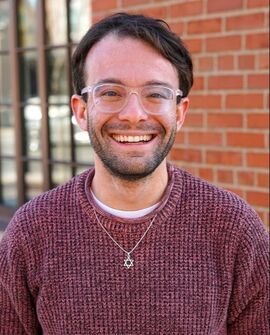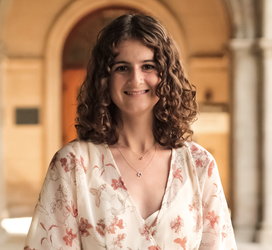Lab Members
Associate Director
Operations Manager
Research Manager
Research Coordinators
Data Scientist
Postdoctoral Fellows
Clinical Interns
Graduate Students
Affiliated Scholars
Research Assistants
Lab Alumni
Associate Director
Operations Manager
Research Manager
Research Coordinators
Data Scientist
Postdoctoral Fellows
Clinical Interns
Graduate Students
Affiliated Scholars
Research Assistants
Lab Alumni
Associate Director

Juan Pablo Zapata, Ph.D.
Dr. Juan Pablo Zapata (he/him/él) is a psychologist and serves as the Associate Director of the Lab for Scalable Mental Health. He is also a Research Assistant Professor of Medical Social Sciences at Northwestern University and the Institute for Sexual and Gender Minority Health. Dr. Zapata obtained his PhD in Clinical Psychology from Marquette University in 2022, and completed his Doctoral Internship in Health Psychology at the University of Washington. Additionally, he completed a NIH T32 Postdoctoral Fellowship (Grant Number: T32MH130325) in Translational Science, HIV, and Sexual and Gender Minority Health. With extensive training and research experience, Dr. Zapata specializes in LGBTQ and Latino mental health, HIV, public health, digital health, and implementation science.
Dr. Zapata's professional focus revolves around the development, adaptation, and evaluation of interventions and implementation strategies to achieve health equity among key populations affected by HIV and mental health disparities. During his T32 Fellowship, he actively participated in three national effectiveness-implementation hybrid trials of eHealth interventions for adolescents and young sexual minority men. Much of his independent research has centered on adapting and assessing culturally grounded implementation strategies aimed at scaling up and disseminating evidence-based HIV prevention (e.g., PrEP) and behavioral health interventions to Latino men who have sex with men. In 2024, Dr. Zapata joined the Lab for Scalable Mental Health and collaborates closely with Dr. Jessica Schleider to develop, test, adapt, and disseminate scalable, evidence-based mental health solutions, with a particular emphasis on single-session interventions (SSIs) for underserved youth.
Dr. Zapata's research in the field of health psychology and public health has led to several publications in journals, as well as presentations at national and international conferences. He is also actively involved in teaching and mentoring future generations of psychologists through his role as a Research Assistant Professor. In addition to his academic work, Dr. Zapata is committed to promoting diversity and inclusion within the field of psychology and public health. He has served on various committees and organizations dedicated to advancing the representation and well-being of LGBTQ individuals, people of color, and other marginalized groups.
E-mail: [email protected]
Operations Manager

Shannon Hill, M.P.H.
Shannon (he/him) is the Operations Manager for the Lab for Scalable Mental Health. He previously worked under Northwestern University’s Department of Medicine as an Associate Research Administrator, supporting multiple divisions in the pre & post-award grant management process. He received his M.P.H. in Public Health Administration through Indiana University, with interests in youth mental health and policy development.
E-mail: [email protected]
Research Manager

Andy Rapoport, M.P.H.
Andy (he/him) is the Research Manager in the Lab for Scalable Mental Health. He studied Biological Sciences & Public Policy at the University of Chicago. He then worked in operations & research management at healthcare technology startups, in the fields of dementia & surgery. In 2021, Andy received a Master's in Public Health (MPH) from Northwestern University, with a concentration in Community Health Research. His Culminating Experience project was with the National Alliance on Mental Illness (NAMI) Chicago. Andy worked with the City of Evanston's Department of Health & Human Services on their community health assessment, for his Applied Experience and after graduation. Most recently, he worked at CJE SeniorLife managing public health research projects in the field of aging, as it pertains to exercise & also specifically to long-term survivors of HIV. Andy is passionate about equitable access to mental healthcare, especially as it intersects with policy & technology.
E-mail: [email protected]
Research Coordinators

Amanda Smock, B.S.
Amanda (she/her) is a research study coordinator in the Lab for Scalable Mental Health. She graduated from the University of Florida in 2021 with a B.S. in Psychology and a minor in Women's Studies. Previously, she worked as a research assistant with the ABCD Study studying adolescent brain development and health. Amanda's interests include developing and disseminating accessible mental health interventions, particularly for those in marginalized communities. She intends to pursue a Ph.D. in Clinical Psychology.
E-mail: [email protected]

Tyra Bergstrom, B.S.
Tyra (she/they) is a research study coordinator in the Lab for Scalable Mental Health. Tyra earned their B.S. in psychology from Eastern Connecticut State University in 2022, where they worked on a single-session intervention for intrusive thoughts in college students. During their two-year tenure at Brown University as an NIH PREP scholar and research assistant in Dr. Laura Stroud’s lab, Tyra contributed to several longitudinal studies examining psychosocial predictors of intergenerational health. They are broadly interested in emotion dysregulation following traumatic experiences and discrimination in marginalized groups, with a specific focus on people with disabilities. Tyra intends to pursue a Ph.D. in Clinical Psychology to develop disability-affirming interventions.

Arielle Smith, B.A.
Arielle (she/her) graduated from Washington University in St. Louis with a B.A. in Psychological & Brain Sciences in 2022, with a concentration in Experimental Psychopathology. Arielle’s research interests include eating disorders in youth, as well as the use of digital mental health interventions to increase treatment access. She intends to pursue a Ph.D. in clinical psychology.
E-mail: [email protected]

Ian Sotomayor, B.A.
Ian (he/they) is a Lab Coordinator in the Lab for Scalable Mental Health. He graduated from the University of Southern California in 2021 with a B.A. in Psychology, with honors, a B.A. in Philosophy, and a minor in Religion. They are interested in supporting communities vulnerable to heightened stress and adversity. Ian intends on pursuing a PhD in clinical psychology to develop research in brief interventions and offer clinical services to disempowered communities.
Email: [email protected]

Yama Chang, M.A.
Yama (she/her) is a Data Scientist at the Lab for Scalable Mental Health. She graduated from Teachers College, Columbia University with an M.A. in Clinical Psychology in 2020. Overall, she's fascinated with anything data related. She plans to apply data-driven approaches to developing accessible, scalable interventions to ameliorate disparities in mental health care, particularly among sexual and gender minorities.
E-mail: [email protected]
Links: Website | Github
Postdoctoral Fellows

Arka Ghosh, Ph.D.
Arka Ghosh (he/him) is a postdoctoral fellow with Dr. Jessica Schleider in the Lab for Scalable Mental Health. Arka is a recent graduate from the Biological Sciences and Bioengineering department of the Indian Institute of Technology, Kanpur. During his PhD, he developed a digital mental health intervention, TreadWill. He is primarily interested in developing digital mental health interventions and hopes to make evidence-based digital interventions available for free in low-income countries.
E-mail: [email protected]

Erica Szkody, Ph.D.
Erica Szkody (she/they) is a Clinical Psychology graduate from Mississippi State University and a Postdoctoral Fellow working with Dr. Jessica Schleider in the Lab for Scalable Mental Health. Erica’s research focuses on understanding the contextual factors that influence social support behaviors. In the future, she plans to apply her research to develop culturally sensitive interventions that leverage healthy relationships to improve health outcomes.
E-mail: [email protected]

Benji Kaveladze, Ph.D.
Benji Kaveladze (he/him) is a Postdoctoral Researcher in the Lab for Scalable Mental Health. He received his PhD in Psychological Science from UC Irvine. He studies online single-session interventions for loneliness and is interested in making mental health resources more appealing and effective for more people.
E-mail: [email protected]

Hena Thakur, Ph.D.
Hena Thakur (she/her) is a graduate of the Clinical-Community Psychology PhD program at the University of Illinois, Urbana-Champaign and a postdoctoral fellow in the Lab for Scalable Mental Health, beginning August 2024. Hena’s research focuses on understanding the pathways to resilience in the aftermath of childhood trauma. As a fellow, Hena hopes to design single session interventions that facilitate recovery in the face of youth adversity.
Clinical Interns

Jeremy Eberle, M.A.
Jeremy Eberle (he/him) is a PhD candidate in clinical and quantitative psychology at the University of Virginia on clinical internship at the Stony Brook University Consortium. His research seeks to elucidate the cognitive, affective, and behavioral processes that maintain emotional disorders and the pathways by which psychological treatments can change those processes. By identifying mechanisms of disorder and change, he hopes to advance the development and dissemination of targeted, scalable, and personalized interventions. He also has interests in methodology and open science.
E-mail: [email protected]
Links: Website
Ph.D Students

Jenna Sung, M.A. (on internship)
Jenna (she/her/hers) is a sixth-year Clinical Psychology Ph.D. student at Stony Brook University, completing clinical internship at Massachusetts General Hospital/Harvard Medical School. Jenna graduated from Emory University with a B.A. in Psychology. Her primary research goal is to increase access to mental health treatment by testing and disseminating accessible, scalable interventions that can address multiple level barriers to care. Jenna also aims to maximize the impact of this research by engaging with policy level work.
E-mail: [email protected]
Links: CV

Jenny Shen, M.A. (on internship)
Jenny (they/them/) is a sixth-year Clinical Psychology Ph.D. student, completing clinical internship at the Semel Institute for Neuroscience & Human Behavior/UCLA. They graduated from University of Toronto with a B.S. in Psychology and received an M.A. in Clinical Psychology at Teachers College, Columbia University. Jenny's research interests include (1) elucidating the impact of minority stress on mental health disparities among gender and sexual minorities, racial and ethnic minorities, and their intersections; (2) ameliorating the effects of such minority stressors through accessible, transdiagnostic interventions; and (3) identifying implications for policy. Jenny is also a student in Dr. Nick Eaton's lab and is co-mentored by Drs. Schleider and Eaton.
E-mail: [email protected]
Links: CV

Isaac Ahuvia, M.A.
Isaac (he/him/his) is a fifth-year Clinical Psychology Ph.D. student at Stony Brook University. Isaac graduated from the University of Michigan with a B.A. in Sociology in 2016, and has worked at Northwestern University's Feinberg School of Medicine and the University of Chicago Poverty Lab. He is interested in individuals' beliefs about mental health and illness, as well as the social construction of mental illness more broadly. His research examines the relationship between individuals' beliefs about mental health and their mental health outcomes.
E-mail: [email protected]
Links: Website

Riley McDanal, M.A.
Riley (she/her/hers) is a fifth-year Clinical Psychology Ph.D. student at Stony Brook University. She graduated from U.C. Berkeley with a B.A. in Psychology, where she studied idiographic network models of psychopathology under the mentorship of Dr. Aaron Fisher. Riley is interested in potential data-driven changes in the classification and treatment of mental health problems. She aims to leverage the integration of HiTOP and Network Analytic methods to inform transdiagnostic intervention efforts, particularly for LGBTQ+ youth and young adults. Riley is also a student in Dr. Nick Eaton's lab and is co-mentored by Dr. Schleider and Dr. Eaton.
E-mail: [email protected]
Links: Website

Katie Cohen, M.A.
Katie (she/her/hers) is a student in the Social Sciences and Health track of the Health Sciences Integrated Ph.D. Program at Northwestern University. She received a B.S. in Psychology from the University of South Carolina, an M.A. in Psychology from Stony Brook University, and an M.A. in Clinical Psychology from Northwestern University. Katie is interested in the integration of non-traditional mental health interventions (single session interventions, mental health apps, peer support, etc.) into traditional settings frequented by youth and young adults (schools, primary care, etc.). She is committed to leveraging user-centered design and community-based participatory research methods in her work to ensure that interventions are designed to meet participants’ needs and minimize the research-to-practice gap.
E-mail: [email protected]
Links: Website

Chantelle Roulston, B.A.
Chantelle (she/her/hers) is a third-year Clinical Psychology Ph.D. student at Northwestern University. She graduated from Stony Brook University in 2020 with her B.A. in Psychology and Sociology. She is passionate about supporting underserved communities through her research, particularly youth of Color, LGBTQ+ youth, and youth living at the intersection of both identities. Specifically, Chantelle aims to use her work to help increase mental health support accessibility and to build and disseminate brief interventions with and for members of these communities.
E-mail: [email protected]

Tubanji Walubita, B.A.
Tubanji (she/her) is a doctoral student in the Social Sciences and Health track of the Health Sciences Integrated Ph.D. Program at Northwestern University. She earned her B.A. in Biology and Gender, Sexuality, & Women’s Studies from Lake Forest College and completed a post-baccalaureate program in Clinical and Population Health Research at the University of Massachusetts Chan Medical School. Her research focuses on identifying social and structural determinants of mental health inequities. Tubanji is committed to advancing health equity and aims to contribute to the development of tailored interventions that address the specific needs of underserved communities, particularly LGBTQ+ individuals and people of color.
E-mail: [email protected]

Dr. Schleider will not review applications for a new Ph.D. student for the 2025-2026 academic year. In other years, Dr. Schleider reviews applicants from both the Clinical Psychology PhD Program and the Health Sciences Integrated PhD Program (a non-clinical program focused on applied, social science-driven health research), via the Social Sciences & Health track. Both programs are housed within Northwestern University's Feinberg School of Medicine.
More information about applying to join the Lab for Scalable Mental Health as a Ph.D. student is available here.
M.A. Students

Jessica Liao, B.A.
Jessica (she/her) is currently pursuing a M.A. in Clinical Psychology at Northwestern University. She graduated from Stony Brook University with a B.A. in Psychology. Her research interests include understanding factors (i.e., minority stress) that enhance the development of substance use in youth and its impact on functioning in interpersonal relationships, as well as developing targeted, accessible interventions for minority group. In the future, she plans on pursuing a Ph.D. in Clinical Psychology.

Mingjing Huang, B.A.
Mingjing (she/her) is a current master’s student in Clinical Psychology at Northwestern University. She graduated from the University of Rochester with a B.A. in Psychology and two minors in Statistics and Computer Science. Broadly, she is passionate about making mental health resources more accessible to underserved populations. In particular, she is interested in developing effective digital mental health interventions to promote women’s health and healthy parent-child relationships in Asian communities. In the future, she plans to create children’s books on mental health and pursue a Ph.D. in clinical psychology.

Ashley Knapp, Ph.D.
Ashley (she/her) is an assistant professor of Psychology and Behavioral Sciences and core faculty at the Center for Dissemination and Implementation Science and the Center for Behavioral Intervention Technologies. Her research is focused on youth digital mental health broadly, with a particular interest in designing and implementing accessible, community-based digital tools with marginalized youth and those youth most experiencing inequities. Ashley is currently supported by a NIMH-funded K01 award, where she is partnering with a public library and their teen patrons to co-create a digital mental health service for anxiety to be implemented into the public library’s teen services.
E-mail: [email protected]
X/Twitter: @AshleyAKnapp

Maria Loades, DClinPsy, Ph.D.
Maria (she/her/hers) is a Clinical Psychologist and Reader (Associate Professor) for the Doctorate in Clinical Psychology programme at the University of Bath, UK. Maria has extensive clinical experience in child and adolescent mental health services in the National Health Service, England, and has a post-graduate diploma in cognitive behaviour therapy (CBT) for children, young people and families. Maria has a strong interest improving access to early help for adolescent depression symptoms. This work includes improving mental health awareness, understanding and tackling barriers to problem recognition and help-seeking, and developing and evaluating online, single-session interventions which can be provided at scale. Her ambition is to expand on current provision, and to better meet the needs of those who are under-served by mental health provision, both in the UK and in low and middle income country contexts, like South Africa.

Carter Funkhouser, Ph.D.
Carter Funkhouser (he/him/his) is a postdoctoral fellow with Dr. Randy Auerbach at Columbia University. Carter received his PhD from the University of Illinois at Chicago. His research broadly aims to better identify and support young people with or at risk for depression, and he is particularly interested in using digital tools to offer scalable, accessible, and timely mental health support. Carter is currently supported by a Klingenstein Third Generation Foundation fellowship, and he is working to design and evaluate online interventions that can be disseminated at scale and in places that maximize their visibility, reach, and uptake.
Research Assistants

Hein Kim
Hein (any pronouns) is an undergraduate at Northwestern University pursuing a B.A. in Computer Science. They are interested in researching how to make mental health treatments more effective and tailored to each individual’s needs, particularly for LGBTQ+ youth. Hein intends to go to medical school and continue investigating the development and dissemination of digital mental health interventions.

Tania Miller
Tania (she/her/hers) is an undergraduate student at Northwestern University pursuing a dual major in Neuroscience with a concentration in Biology and Psychology. After completing her undergraduate studies, Tania plans on attending a physician assistant graduate program in order to continue gaining a holistic understanding of the human mind and body. Tania aims to make a meaningful impact in patient care and well-being, especially in regards to mental health.
